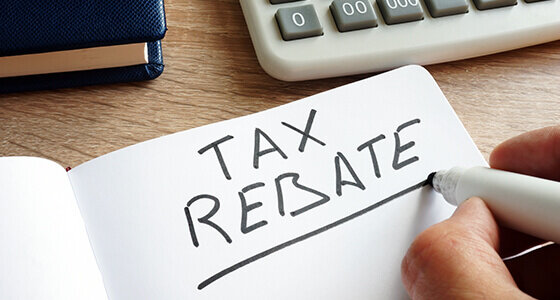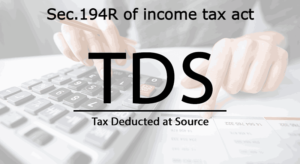
Individual can claim rebate u/s 87A of income tax for calculating his/her income tax liability.
What is rebate??
Rebate means sum of money that given back to you because you paid too much. For instance you purchased computer of Rs. 45,000 along with this also bought a mobile phone of Rs. 15,000 , therefore shopkeeper gave you rebate Rs. 6,000.
Again, the meaning described above is very general in term. In addition to above, Income tax ‘rebate’ is a word used in various senses which means decreases in income tax liability.
Further, the term rebate means refund that you are eligible for in case you pay tax more . For instance your tax liability is Rs. 16,000 but your employer pay the Govt a TDS to Rs.18,000 in such case you are eligible for rebate/refund of Rs. 2000.
Finally ,the term rebate become popular after introduction of section 87A of income tax act, 1961.
What is Rebate u/s 87A – Income tax??
The provisions of section 87A provides that reduces income tax liability of an individual. For financial year 2021-22( a. y. 22-23) a resident individual can claim rebate of Rs. 12,500 if gross taxable income of an resident individual does not exceed 5,00,000. In brief If your income tax liability is Rs. 14,000 then section 87A will provides rebate of 12,500 means net tax liability will be 1,500.
On other hand , on february 2023 finance minister has announced new tax regime for financial year 2022-23. under which rebate u/s 87A – Income tax has been increased from 12,500 to 25,000. In brief under new tax regime , taxable income upto 7,00,000.
Note: This rebate is allowed before adding education cess.
Who can claim rebate u/s 87A?
Only resident individual can claim rebate u/s 87A of income tax. It means non resident individuals are not eligible for this rebate.
Can HUF/Firm claim rebate u/s 87A?
No, Only resident individual can claim rebate u/s 87A. It means HUF, Firm, or company are not eligible for this rebate.
How to calculate rebate let us Learn with example
Mr. A resident individual working with ABC Ltd and he earns salary of Rs. 6,50,000 for financial year 2022-23. ABC Ltd deposited TDS on behalf of Mr. A Rs. 14,500 to Govt. And saving bank interest Rs.5,400, paid LIC premium Rs. 5,200 . During the year he has earned LTCG income Rs.2000.
Solution:
Since Mr. A is resident individual , he is eligible for rebate u/s 87A.
Gross Salary Income 6,50,000
Less : Standard deduction u/s 16(i) (50,000)
Net Salary Income 6,00,000
LTCG Income 2,000
Income from saving bank interest 5,400
Gross total Income 6,07,400
Less : Deductions Nil
Total Income 6,07,400
Note: Since Mr. A’s Gross total income is below 7,00,000 he is eligible for this rebate u/s 87A. But LTCG income cannot be allowed for rebate. LTCG income is directly taxed at 10%. It means income Rs. 6,05,400 is eligible for rebate u/s 87A.
Income Rate Tax Amount
Upto 2,50,000 Nil
2,50,001 to 5,00,000 5% of 2,50,000 12,500
5,00,001 to 6,05,400 10% of 1,05,400 10,540
Tax Liability 23,040
Less: Rebate u/s 87A (23,040)
Tax Liability Nil
Tax on LTCG Income 20,000*10/100 2000
Add: Education Cess 4% of 2000 80
Net Tax Liability 2080
Above income tax liability is calculated as per the new tax regime . Therefore chapter VIA (80C) deduction has not been claim. You can refer comparison of old and new tax regime https://taxandfinanceguide.com/?p=29&preview=true.



[…] Rebate u/s 87A-https://taxandfinanceguide.com/?p=183&preview=true […]
[…] new tax regime Rebate u/s 87A-https://taxandfinanceguide.com/?p=183&preview=true has been increases from 5,00,000 (tax rebate 12,500) to 7,00,000(tax rebate 25,000). This means any […]